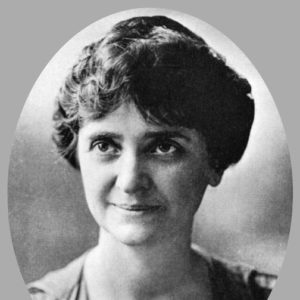calsfoundation@cals.org
Lillian Dees McDermott (1877–1965)
Lillian M. Dees McDermott was a social worker and community leader in Little Rock (Pulaski County). She made great strides to improve the juvenile courts, schools, and the field of social work. Referred to as the “dean of social workers in Arkansas,” she was the first person in Arkansas to become a certified professional social worker.
Lillian Dees was born to Hardy Scott Dees, a farmer and businessman, and Mary Frances Pace Dees on October 4, 1877, near Little Rock. After attending Little Rock public schools, Dees graduated with a degree from Galloway Women’s College in Searcy (White County), which merged with Hendrix College in Conway (Faulkner County) in 1933. She later served on the Board of Trustees for Hendrix College and received an honorary Doctor of Laws degree from the college in 1937.
On January 30, 1895, Dees married William Pryor McDermott in Little Rock. They had a son and a daughter. Early in their marriage, William McDermott worked primarily as a salesman for Plunkett-Jarrell Grocery Company. While her husband was away serving in army intelligence during and shortly after World War I (he was stationed in Italy at the end of the war), McDermott began her public life.
Judge Lee Miles, judge of the county, probate, and juvenile courts of Pulaski County, appointed McDermott assistant county probation officer in 1918. When the chief county probation officer of Pulaski County, Jennie Dodge, resigned in 1921, McDermott was promoted to that position by Judge Miles. In preparation for this new work, McDermott attended night classes at Arkansas Law School in 1922 and 1923 and studied social work at the University of Southern California in 1924.
In 1926, McDermott worked with Judge Clarence Price (C. P.) Newton to organize the Pulaski County Juvenile Court. McDermott served as juvenile court referee from 1927 until 1941. While she served on the court, the National Probation Association recognized the court as one of the best in the country.
After petitions from the City Federation of Women’s Clubs, McDermott was appointed to Little Rock School Board in 1922. She remained on the board until 1946 and served as the first female president when Little Rock Senior High School (now Central High School) was built in 1927 and Dunbar High School (now Dunbar Middle School) was built in 1929.
McDermott left the position as referee of the Pulaski County Juvenile Court in January 1941 to become the state special coordinator of the Professional and Service Division of the Works Progress Administration (WPA). McDermott organized the Family Service Agency, a Community Chest agency, which opened in 1942, and served as its director in the position of executive secretary from 1942 until she retired in 1964. The Family Service Agency’s primary focus was on marriage counseling, care for children from broken homes, and education for parents to prevent marital strife.
In addition to her work, McDermott was active in many organizations and committees, serving as a delegate to the Mid-century White House Conference on Children and Youth, a member of the advisory committee for the United States Children’s Bureau, and state director of the Women’s Division of the National Recovery Administration in 1933, among many others. Throughout her lifetime, McDermott received many awards recognizing her accomplishments. She was named Little Rock’s most useful citizen in 1936. The Pilot Club named her woman of the year in 1942 for her work with members of the armed forces and their families. In 1961, McDermott was elected woman of the year in Greater Little Rock in the Arkansas Democrat’s annual poll.
Shortly after her retirement, McDermott died at her home in Little Rock on April 30, 1965. She is buried at Oakland Cemetery in Little Rock.
For additional information:
“Family Doctor’ for 20 Years.” Arkansas Democrat Sunday Magazine. June 10, 1962, pp. 1, 4.
“Leader Plans to Retire From Agency.” Arkansas Gazette. June 21, 1964, p. 8A.
“Mrs. McDermott Takes Post of Co-ordinator.” Arkansas Gazette. January 19, 1941, p. 1.
Julienne Crawford
Arkansas History Commission and State Archives
 Early Twentieth Century, 1901 through 1940
Early Twentieth Century, 1901 through 1940 Law
Law Politics and Government
Politics and Government Lillian McDermott
Lillian McDermott 




Comments
No comments on this entry yet.